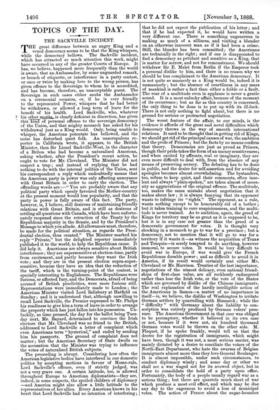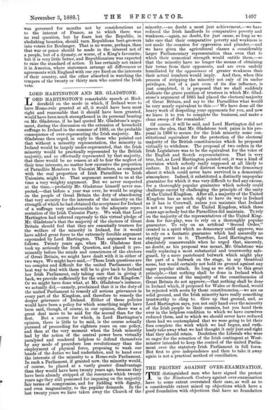TOPICS OF THE DAY.
THE SACKVILLE INCIDENT.
TETgreat difference between an angry King and a exed democracy seems to be that the King whispers, while the democracy bellows. The Sackville incident, which has attracted so much attention this week, might have occurred in any of the greater Courts of Europe. It has, we believe, happened more frequently than the world is aware, that an Ambassador, by some unguarded remark, or breach of etiquette, or interference in a party contest, or once or twice by making love to the wrong person, has given offence to the Sovereign to whom he is accredited, and has become, therefore, an unacceptable guest. The Sovereign in such cases either snubs the Ambassador on a ceremonial occasion, or, if he is very friendly to the represented Power, whispers that he had better be withdrawn, or allowed a long term of leave for the benefit of his health. Lord Sackville, who, whatever t his other m_eLits..is dearly deficient in discretion, has given this of personal offence to the sovereign democracy of the Union, and that mighty monarch has asked for his withdrawal just as a King would. Only, being unable to whisper, the American potentate has bellowed, and the noise has disturbed quiet folk. An unscrupulous re- porter in California wrote, it appears, to the British Minister, then Sir Lionel Sackville-West, in the character of a Briton who had become a naturalised American, asking whether, after the President's recent action, he ought to vote for Mr. Cleveland. The Minister did not suspect a trap ; and instead of replying that he had nothing to do with the internal politics of the Union, sent his correspondent a reply which undoubtedly means that the Amencan party in power was only affecting annoyance with Great Britain in order to carry the election. The offending words are :—" You are probably aware that any political party which openly favoured the Mother-country at the present moment would lose popularity, and that the party in power is fully aware of this fact. The party, however, is, I believe, still desirous of maintaining friendly relations with Great Britain, and is still as desirous of settling all questions with Canada, which have been unfortu- nately reopened since the retraction of the Treaty by the Republican majority in the Senate, and by the President's Message to which you allude. All allowances must, therefore, be made for the political situation, as regards the Presi- dential election, thus created." The Minister marked his reply "Private," but the delighted reporter immediately published it to the world, to help the Republican cause. It did. help it. Americans are always sensitive about British interference ; they are supersensitive at election-time, partly from excitement, and partly because they want the Irish vote ; and they are in the present election supra-super- sensitive, because they have an idea that the reduction of the tariff, which is the turning-point of the contest, is specially interesting to Englishmen. The Republicans were furious, or affected fury, and the Democrats, afraid of being accused of British proclivities, were more furious still. Representations were immediately made to London ; the American Minister visited Lord Salisbury at Hatfield on Sunday ; and it is understood that, although unwilling to recall Lord Sackville, the Premier expressed to Mr. Phelps his readiness to give him a term of leave in order to arrange the property which has just fallen into his possession. Un- luckily, as time pressed, the day for the ballot being Tues- day next, Mr. Bayard, determined to convince the Irish electors that Mr. Cleveland was no friend to the British, addressed to Lord Sackville a letter of complaint which even Americans term " hysterical," and ended by sending him his passports. The ground of complaint does not matter ; but the American Secretary of State dwells on the accusation that the Minister was trying to influence the votes of naturalised British subjects. The proceeding is abrupt. Considering how often the American legislative bodies have interfered in our domestic politics by accepting motions in favour of Home-rule, Lord Sackville's offence, even if strictly judged, was not a very grave one. A certain latitude, too, is allowed throughout Europe to American diplomatists—they are, indeed, in some respects, the spoiled children of diplomacy —and America might also allow a little latitude to the representatives of her allies. Every American knows in his heart that Lord Sackville had no intention of interfering ; that he did not expect the publication of his letter ; and that if he had expected it, he would have written a. very different one. There is something ungenerous in making so much of a silliness, and visiting a blunder on an otherwise innocent man as if it had been a crime.. Still, the blunder has been committed ; the Americans: are technically in the right ; and if one is disappointed to find a democracy as petulant and sensitive as a King, that is matter for sorrow, and not for remonstrance. We should withdraw Sir E. Malet from Berlin if the Emperor took a personal dislike to him, and there is no reason why we should be less complaisant to the American democracy. It is not quite so mannerly as a King would be, indeed it is unmannerly ; but the absence of courtliness in any mass of mankind is rather a fact than either a foible or a fault.. The roar of a multitude even in applause is never a gentle. sound. It is a most unlucky affair, because of the moment of its occurrence ; but as far as this country is concerned, the only thing to be done is to put up with its ill-luck. There is not only nothing to fight about, but there is no. ground for serious or protracted negotiation.
The worst feature of the affair, to our minds, is the evidence it affords of the great and novel difficulties which democracy throws in the way of smooth international relations. It used to be thought that in getting rid of Kings, we should get rid of the principal causes of war, the ambition and the pride of Princes ; but the facts by no means confirm that theory. Democracies are just as proud as Princes, though their pride takes the form of an uneasy sensitiveness; and when excited by affronts, real or imaginary, they are even more difficult to deal with, from the absence of any means of preserving secrecy. The debating has to be done in public, and the desire for self-assertion and for avoiding- apologies becomes almost overwhelming. The bystanders, too, refuse to keep quiet, and their comments, often inso- lent and always " plain-spoken," are taken almost of neces- sity as aggravations of the original offence. The multitude, too, makes the same mistake about negotiation that it makes about law ; it is always fancying that its opponent wants to infringe its " rights." The opponent, as a rule, wants nothing except to be honourably rid of a bother ; but it takes training to cure suspiciousness, and the multi- tude is never trained. As to ambition, again, the greed of Kings for territory may be as great as it is supposed to be, but it is in any case not greater than the greed of a. democratic government for votes. It is thought very shocking in a monarch to go to war for a province ; but a. democracy, not to mention that it will go to war for a. territory if it wants it—as witness the acquisition of Texas and Tonquin—is sorely tempted to do anything, however immoral, to secure votes. It would be very difficult to avoid war in Europe, if war would give the French Republicans durable power ; and as difficult to avoid it in America, if its result would certainly seat either Mr.. Cleveland or Mr. Harrison. Treaties of the last importance, negotiations of the utmost delicacy, even national friend- ships of first-class value, are all recklessly endangered rather than lose the Irish vote, or the vote of the States which are governed by dislike of the Chinese immigrants. The real explanation of the hardly intelligible action of the Americans in Samoa—a matter of no importance in itself—is, we believe, the dislike of Washington to irritate German settlers by quarrelling with Bismarck ; while the " difficulty " with Germany about the liability to con- scription was entirely produced by German voters' pres- sure. The American Government in that case was obliged to be peremptory, whether it believed in its own case or not, because if it were not, six hundred thousand German votes would be thrown on the other side. M. Floquet, if he spoke frankly, would tell us that the decree for the registration of immigrants, which might have been, though it was not, a most serious matter, was mainly dictated by a desire to conciliate the voters of the North-East Department, who hate the swarms of Belgian immigrants almost more than they love General Boulanger. It is almost impossible, under such circumstances, to conduct diplomacy wisely ; and some day or other we shall see a war waged not for its avowed object, but in order to consolidate the hold of a party upon office. Fortunately, the body of a people usually regard war as a serious thing ; but there are quarrels much short of war which produce a most evil effect, and which may be due any day to the eagerness to avoid a loss of municipal votes. The action of France about the sugar-bounties was governed for months not by considerations as to the interest of France, as to which there was no real question, but by fears lest the Republic, in abolishing bounties, should turn Republican beet-growers into voters for Boulanger. That is no worse, perhaps, than that war or peace should be made in the interest not of a people, but of a dynasty, or worse, of a King's favourite; but it is very little better, and Republicanism was expected to raise the standard of action. It has certainly not raised it in America, where statesmen arrange all differences or agreements with England with one eye fixed on the interests of their country, and the other absorbed in watching the tempers of the twenty or thirty men who control the Irish vote.



















































 Previous page
Previous page